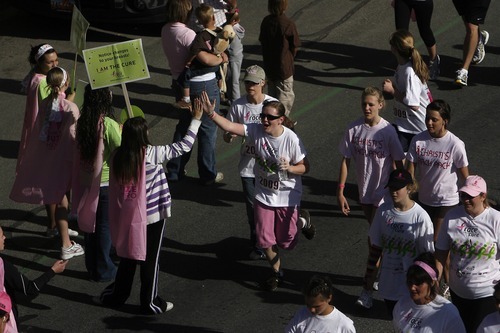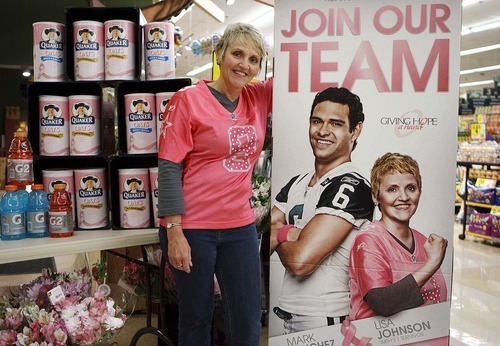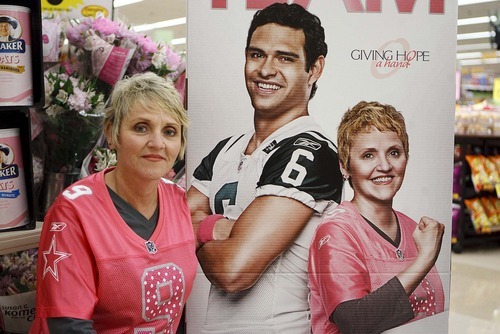This is an archived article that was published on sltrib.com in 2012, and information in the article may be outdated. It is provided only for personal research purposes and may not be reprinted.
Some Utahns are convinced that conservative politics have triumphed over women's health after a decision by Susan G. Komen for the Cure to halt funding for cancer programs offered by Planned Parenthood.
Komen, the breast-cancer charity known for its pink ribbons and annual community runs, decided late last year to stop funding any organization under investigation. Planned Parenthood is being investigated for alleged financial improprieties by Republican Rep. Cliff Stearns of Florida, with the encouragement of anti-abortion groups.
The charity's decision became public Tuesday, igniting criticism and praise across the country.
Mary Woodhead, a Salt Lake City attorney, says she won't be among the thousands of Utahns who participate in this year's Utah Race for the Cure. And she'll discourage her friends, too.
"Now they have specifically identified themselves as part of the anti-women's health care movement," Woodhead said.
By Thursday morning, Komen's Salt Lake City affiliate had received several dozen emails from community members, primarily criticizing the funding decision. Comments on its Facebook page were predominantly negative, with posters calling Komen's decision a "boycott" of Planned Parenthood, which they will support instead.
Planned Parenthood said the Komen grants totaled roughly $680,000 last year and $580,000 the year before, going to at least 19 of its affiliates for breast-cancer screening and other breast-health services.
None of those dollars went to Planned Parenthood in Utah.
In 2008, the state's Planned Parenthood Association received a small Komen grant of $11,925 for breast health cards. The laminated breast-examination guides were designed to hang in the shower, said association director Karrie Galloway.
"But the last time we applied we were not given funding," she said.
Now funding for the laminated cards comes out of the association's $7 million budget, a combination of federal funds, private donations and clinical revenue for care provided patients.
"We're not talking about a lot of money," said Galloway of the rejected Komen application. "But we're on a lean budget, and every little bit helps."
She said people have called the clinic and approached her in public to voice frustration over the ban.
"There are a lot of women out there who give to Komen and Planned Parenthood," she said. "We are two organizations that are fighting to improve health care for women."
Planned Parenthood of Utah started providing abortions in 2010, after the Komen funding ended.
Komen funding has always been limited to breast-health programs, said Debbie Mintowt, executive director of the Komen Salt Lake City affiliate.
"When we have funded [Planned Parenthood] in the past, it is a perception that has been an unspoken support of the other services," she said. "Whereas our involvement has simply been to provide services … related to breast health."
Komen insists the funding to Planned Parenthood has been halted solely due to the new policy prohibiting grants to organizations under federal investigation.
"We will never bow to political pressure," said Nancy Brinker, founder and CEO, in a video statement on the Komen website. "We will always stand firm in our goal to end breast cancer forever."
Breast-cancer survivor Candace Tatton of Utah said Komen's decision hasn't changed her opinion of the organization.
"Without their many years of support for research I WOULD BE DEAD!" she posted on the Salt Lake City Komen Facebook page.
But Woodhead thinks the explanation of the policy change is "suspect."
"I think their decision to withdraw the funding is based on a decision to align themselves with a political movement that is acting against women's health and women's health care," Woodhead said.
Woodhead had earlier been considering joining Utah's Race for the Cure as part of her fitness regimen. More than 16,000 Utahns participated in the 2011 fundraiser, slated for May 12 this year.
Lisa Johnnson, a breast-cancer survivor who raised money for Komen last year, fears the decision will mean fewer women have access to cancer screenings.
The Brigham City woman says she's politically liberal, but she's not angry enough to boycott the organization.
After surviving cancer, chemotherapy and radiation therapy, the Smith's Food & Drug employee agreed to be pictured last year alongside two sports stars in a life-size breast-cancer awareness display inside the store.
"It was such a good experience, and I think Komen does a good job overall," she said. "I'd probably still donate."
The Associated Press contributed to this report.
Donation flood already makes up Komen gap
Planned Parenthood Federation of America may have already replaced the $680,000 in funding it lost from the Susan G. Komen for the Cure foundation for its breast-cancer prevention programs, the group said today.
Riding a wave of Internet appeals, Planned Parenthood received pledges of $400,000 from 6,000 donors as of 2 p.m. yesterday, said Tait Sye, a spokesman. Three large donors also surfaced: The Amy and Lee Fikes' Foundation, run by the head of closely held Bonanza Oil Co. in Dallas, pledged $250,000; New York Mayor Michael Bloomberg said he'll match the next $250,000 given and Credo, a mobile-phone company, promised $200,000.
The decision by the Dallas-based Komen foundation has spurred a tsunami of online comments and petitions that added political fuel to the dispute and involved corporate funders for Komen, including Yoplait, the French yogurt maker, among others.
"This has been a contentious issue," said Chief Executive Officer Nancy Brinker of Komen in a conference call.







